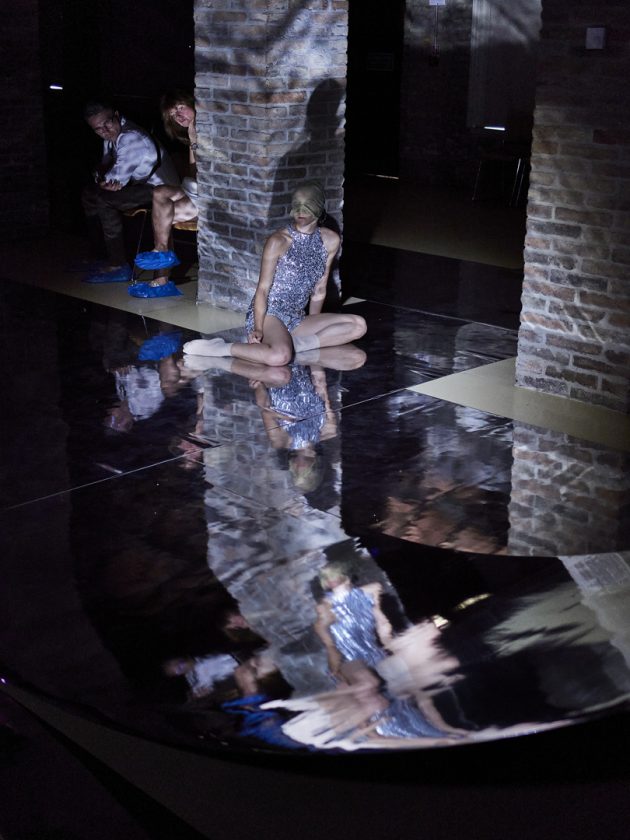There is also the intervention of the artist Alfredo Pirri and the soundtrack of Bruno Dorella in the performance “Paradiso“, presented by gruppo nanou at the Ravenna Festival.
Paradiso - ph. Daniele Casadio, Dancer: Michele Scappa
A liquid universe, where to suspend time and float in a mesmerized space. Mirrored carpets refract an iridescent pain, a languid, dilated ecstasy that floods the walls and trusses of the Artificerie Almagià in Ravenna. Opalescent shimmers color the space, releasing and changing gradients, enveloping the room as if in a single surface. At the ends two tongues of light extend upward, as if to pronounce the meaning of ascent. Paradiso is a place, a context of relationship, a space of waiting, of possibility. Bodies cross, bodies sit, bodies walk and twirl, bodies trace the space always with unprecedented solutions, in a wandering that no longer has a destination, sufficient to itself, like the harmony of a song. Between staying and changing, bystanders are invited to take their place in the space and share it, to move it, to float between happenings. Inspired by the Paradiso by Dante, the long duration performance of gruppo nanou, Alfredo Pirri and Bruno Dorella embodies two of the motifs that distinguish the Cantica: the diffusion of light and the presence of sound which, in Dante's poem, is "harmonious sound of an extraordinary harmony that accompanies the entire course of Paradise”, as the late linguist Luca Serianni pointed out. It does so through collaboration with Alfredo Pirri, a visual artist who has been working for years on the spatiality of light, on the ability to combine the visible with the invisible through it, and to reverberate its vibratory, changeable, perceptive, imaginative aspect in and through the architecture.

Heaven - ph. Daniele Casadio, Dancer: Agnese Gabrielli
The performance Paradiso by gruppo nanou
For Paradiso Pirri has conceived a place of refractions and reflections, dotted with outcropping plexiglas domes that emerge from the surface of the carpets. They appear as islands, landing places, gems, visions that refract and project new rays. The sound composition is entrusted to Bruno Dorella, a versatile musician with some of the most interesting formations of the Italian indie, noise, doom panorama (OvO, Bachi da pietra, Ronin). Here, grappling with electronic, digital and analogue sounds, he dilates the most tribal and abysmal impulses of his musical imagination in a slow motion soundtrack, gaping, soft, warm and dissolved like a fade out. Laconic the joy and grace of this Paradiso, furrowed by twirls and trajectories of dancers and dancers, on the choreographies conceived by Marco Valerio Amico and Rhuena Bracci, who traverse the space with lightness, extension, rapidity. Sometimes even power, as in the actions of Bracci herself, co-founder of the collective, who seems to shine, dazzle, among other presences as a companion of splendour, with her heroic body, powerful and at the same time delicate, open to being, to space, to time, to another, to elsewhere.
The gruppo nanou homage to Dante
Blindfolded faces, glitter streaked costumes, shouting bodies approaching, revealing and whispering mysterious words like in a Babel that has appeased its chaos, because here understanding is conveyed through other thresholds and languages. A figure in a red bathrobe and swimming fins crosses the space in small steps, perhaps Dante, an observer who ironically recalls the human extraneousness to that world of shining souls. And so we remain, suspended and constantly involved, in this house of song, a place of celestial bliss and possibility that expands like a form of contagion in an invitation to abandon ourselves to a dynamic stasis, and together with a static dynamis, where everything changes . An invitation that questions the possibility of participating in one of our Paradises through a constant practice of the body, the definition of a positioning, taking up and occupying space, inhabiting and sharing a time and place of coexistence. In the luminous opacity of this vision, the words of Franco Fortini could echo almost by contrast, very far from Dante's ivory light, which take us back to concrete and impure skies, perhaps gone mad, recalling the possibility of practicing our paradise today in earthly forms, as a form of resistance.
“Look for our equals dare to recognize them
let them judge us lead them be led
to do good with them, to do evil with them
and the good the reality to serve to deny to change”.
